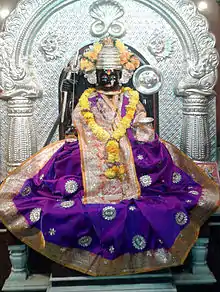Twashta Kasar
Twashta Kasar (also known as Tambat or Kasar) is a Hindu artisan caste of coppersmiths (tamrakar), predominantly residing in the Indian state of Maharashtra. In Goa, they call themselves Twashta Kasar Brahmin. According to Herbert Hope Risley, they are a branch of the Suvarna Banik, who became degraded because they took to working in metal.[1][2]

They are included in the Other Backward Class category by the Government of Maharashtra.[3][4]
Etymology
The word Tambat comes from "tamba" in Marathi or copper in English. The community claims descent from Twashta, third son of Vishwakarma, divine architect of universe.
Traditions
To make water pots of copper and brass is the hereditary business of this community. Over time the artisans refocused their business on making fancy designer showpieces of copper and brass.
The primary religion of Twashta Kasar is Hindu. The community worships Kalika as a guardian deity (Palak Devta). They have established "Twashta Kasar Samaj Samstha Kalika Mandir" in every city wherever they have a sizable population. The Samaj Samstha is a community center where they organize events. In Pune, the community has been celebrating Ganeshotsav since 1893.[5][6]
Twashta Kasar follow the Brahmins rituals, they have a custom of Upanayana, a threading ceremony as a Sanskar. They possess Brahminisitic gotras.
Although Kokani is their mother tongue, most of them converse in marathi. Traditionally, they are non-vegetarian.[2]
References
- Protective Discrimination: Other Backward Classes in India. p. 124.
Risley (1891) refers to them as an offshoot of the Subarnabanik, who became degraded because they took to working in Kansa or bell -metal. They are also known as Kangabanik in West Bengal. They are known as Kansara in Gujarat and Twasta Kasar or Tambat in Maharashtra. They are known as Tamrakar in Madhya Pradesh. In Goa they call themselves Twashta Kasar Brahmin. In Bihar they are also known as Kanskar. Traditional occupation of Kansari is working on bell-metal.
- K.S.Singh (1998). India's Communities, Volume 5. Oxford University Press. p. 1558.
They enjoy civic amenities and derive benefits from other developmental programmes. In Goa, the Kasar call themselves Twashta Kasar Brahman. They are also referred to as Kasar or Tambat (coppersmith) by the local people. Konkani is their mother tongue, but most of them converse in Marathi. They use the Devanagari script. The Kasar are non-vegetarian...
- "CENTRAL LIST OF OBCs FOR THE STATE OF MAHARASHTRA" (PDF).
- "Central nod for OBC list modification". The Hindu. 2006.
They also include `Aryakshatriya' and `Sarige' as synonyms of Somavamsha Arya Kshatriya and `Hindu Sadaru' castes/communities of Karnataka, Twashta Kasar, Kansar as synonym of `Tambat', `Kurmi' as synonym of Kunbi and `Yellam/Yelam' castes in Maharashtra
- "These coppersmiths' faith glow in tradition". DNA. 27 September 2012. Retrieved 10 May 2013.
- Supriya Shelar (15 September 2010). "Twashta Kasar: ruling devotees' hearts". Sakaal.